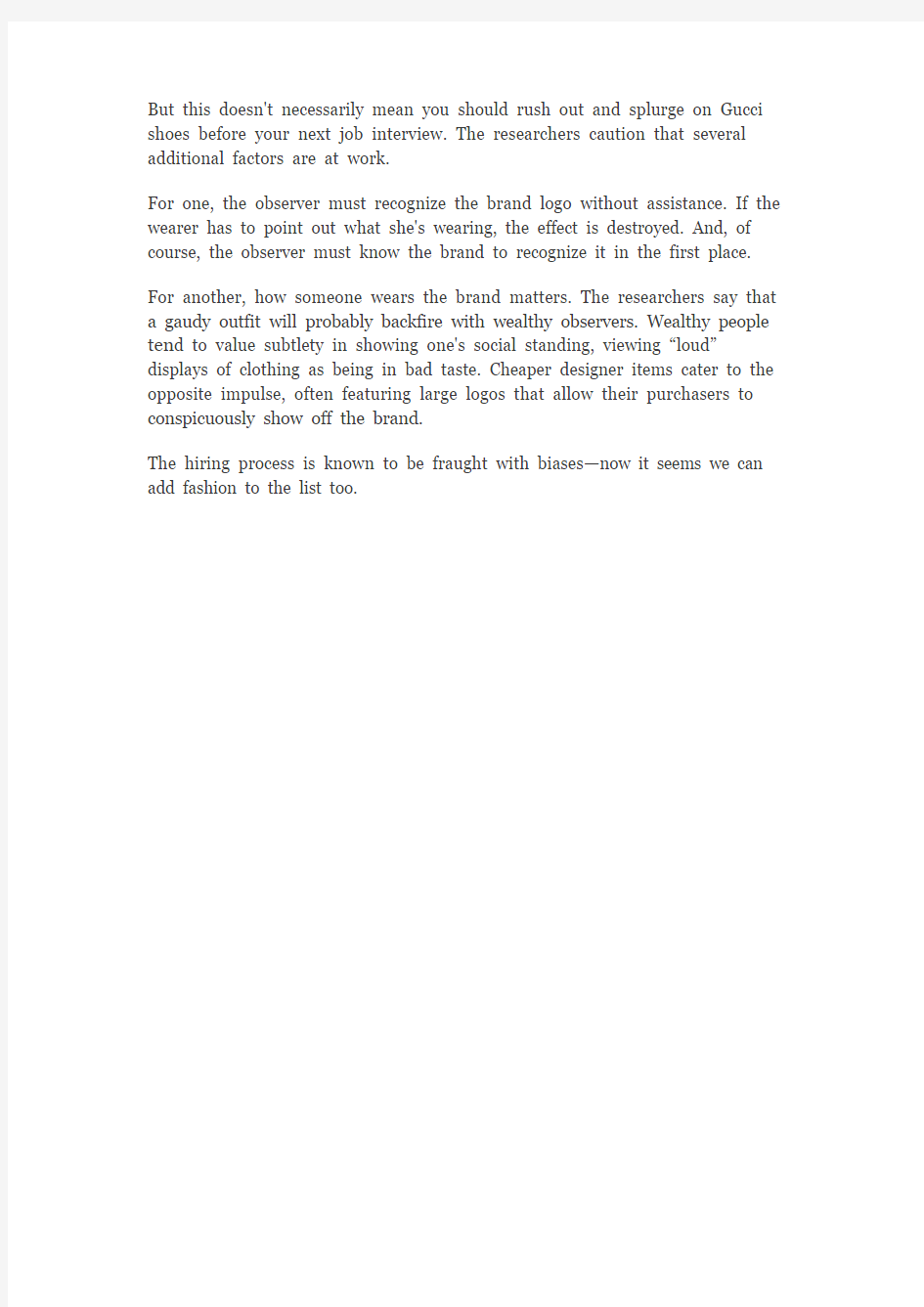Wearing Luxury Brands Makes You Seem More Qualified for the Job


Wearing Luxury Brands Makes You Seem More Qualified for the Job
Imagine this: You're interviewing two people for a job. They're equally competent, capable, and qualified—but you can see that one is wearing an outfit from H&M and the other's clothes are clearly from Louis Vuitton. Which candidate will you hire?
A new study in the Journal of Business Research suggests you're more likely to choose the latter. Surveying students at a large urban university in Seoul, South Korea, researchers from Yonsei University and Coastal Carolina University examined how we react to others depending on the brands they're wearing. To do so, they tested several scenarios of someone wearing a luxury brand logo, a logo from a non-luxury brand, or no logo. They found that in nearly every situation, people gave preferential treatment to the person wearing the luxury logo.
The researchers call this effect an example of costly signaling theory, which says that peopl e show off to “signal” to others that they can afford to do so. In the case of luxury brands, the theory predicts that people wear expensive clothing to flaunt that they can afford it, thereby increasing their status in the eyes of others.
In the study's first scenario, 180 observers were shown a picture of a woman wearing a white polo shirt and asked to rate her wealth, status, attractiveness, trustworthiness, and other characteristics. Three versions of the picture were used, identical except for the shirt's visible brand logo (luxury, non-luxury, or none). The observers of the luxury logo rated the woman significantly higher on wealth and status than did the observers of the non-luxury logo or no logo. In the second scenario, 150 observers watched a video of a woman being interviewed for an internship. Three versions of the video were used, again identical except for the logo on the woman's shirt. The observers rated the woman on a number of characteristics, but this time they also judged her suitability for the job and the pay she should receive. Observers of the luxury logo rated the woman most suitable for the job, again with significantly higher status and wealth ratings. The luxury observers also thought she deserved the highest compensation. Asked to choose her hourly pay from five ranges, over half of luxury observers chose one of the top two ranges—far greater than the 12% of non-luxury observers and 10% of no-logo observers who did the same.
But this doesn't necessarily mean you should rush out and splurge on Gucci shoes before your next job interview. The researchers caution that several additional factors are at work.
For one, the observer must recognize the brand logo without assistance. If the wearer has to point out what she's wearing, the effect is destroyed. And, of course, the observer must know the brand to recognize it in the first place.
For another, how someone wears the brand matters. The researchers say that a gaudy outfit will probably backfire with wealthy observers. Wealthy people ten d to value subtlety in showing one's social standing, viewing “loud” displays of clothing as being in bad taste. Cheaper designer items cater to the opposite impulse, often featuring large logos that allow their purchasers to conspicuously show off the brand.
The hiring process is known to be fraught with biases—now it seems we can add fashion to the list too.
- (部编版九下 道德与法治 早读PPT) 第三课 与世界紧密相连
- 精选-九年级道德与法治下册第二单元世界舞台上的中国第三课与世界紧相连第1框中国担当课件新人教版
- 部编人教版九年级《道德与法治》下册第三课《与世界紧相连》精品课件
- 《与世界紧相连》世界舞台上的中国PPT课件(第1课时中国担当)
- 第二单元 第三课《与世界紧相连》世界舞台上的中国课件(第2课时与世界深度互动)
- 九年级道德与法治下册 第二单元 世界舞台上的中国 第三课 与世界紧相连 第1框 中国担当习题课件 新人教版
- 九年级道德与法治下册 第二单元 世界舞台上的中国 第三课 与世界紧相连 第2框 与世界深度互动课件1
- 部编版九年级道德与法治下册第三课与世界紧相连PPT课件
- 部编人教版九年级下册道德与法治第三课《与世界紧相连》优秀配套课件 教案(2课时)
- 人教版九年级道德与法治下册第三课与世界紧相连3.2与世界深度互动课件
- 第3课 与世界紧相连.ppt
- 中国担当-与世界紧相连ppt优秀课件
- 人教版九年级道德与法治下第三课与世界紧相连ppt教学课件
- 第三课 与世界紧密相连
- 《与世界紧相连》世界舞台上的中国(第1课时中国担当)PPT课件
- 《与世界紧相连》世界舞台上的中国PPT课件(第2课时与世界深度互动)
- 《中国担当》与世界紧相连课件PPT
- 《中国担当》与世界紧相连PPT【优秀课件】
- 部编人教版九年级下册道德与法治第三课《与世界紧相连》优秀课件(2课时)
